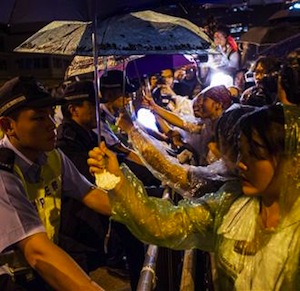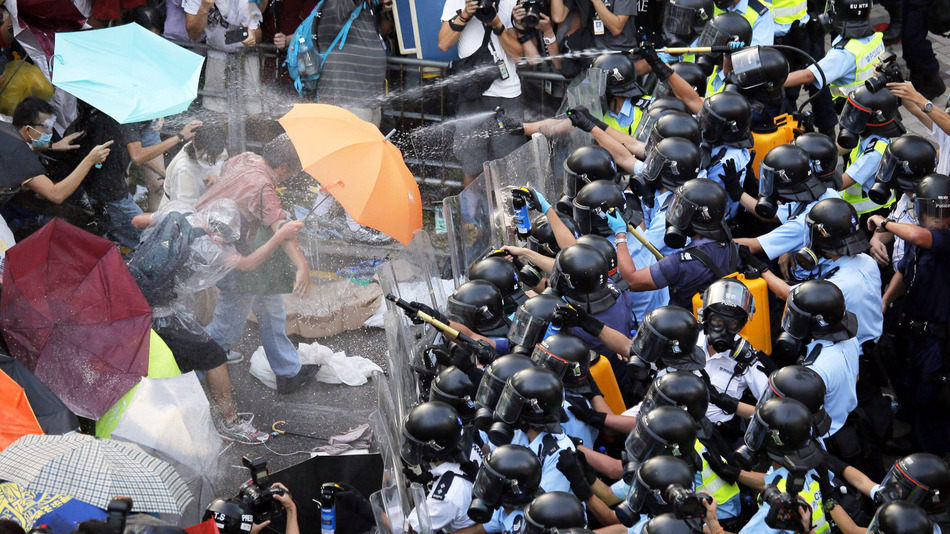 Tens of thousands of demonstrators gathered in Hong Kong this past week in a pro-democracy protest, and China’s vast internet censorship system in the mainland has been working feverishly to keep its citizens in the dark.
Tens of thousands of demonstrators gathered in Hong Kong this past week in a pro-democracy protest, and China’s vast internet censorship system in the mainland has been working feverishly to keep its citizens in the dark.
One country, two systems
Hong Kong now belongs to China, but until 1997, the city was under British rule.
After gaining Hong Kong as a colony during the First Opium War, British rule was set to expire in Hong Kong in 1997. In the years leading up to reunification, British Prime Minister Margaret Thatcher made an agreement with China’s leader, Deng Xiaoping, that after Hong Kong’s scheduled return to China, Hong Kong would maintain its capitalist system for the next 50 years despite the existing socialist order in the mainland. This decision resulted in the formation of Hong Kong’s Basic Law, which guarantees its citizens, among other things, freedom of speech, freedom of the press, freedom of association and assembly, and freedom of religious belief. The division in political and economic systems between mainland China and Hong Kong is referred to as “one country, two systems.”
The recent demonstrations in Hong Kong were instigated by a decision in Beijing to impose limits on the 2017 election of Hong Kong’s chief executive, forcing voters to choose from a list of pre-approved candidates handed down from government officials. Tens of thousands of protesters have gathered in Hong Kong’s financial district this past week, calling for the resignation of Hong Kong’s leader, Chief Secretary Leung Chun-ying, full and open elections for his successor, and universal suffrage– changes to remedy what they’re calling “fake democracy.”
The Great Firewall of China
While Hong Kong citizens enjoy freedom on the Internet, citizens in the mainland are under strict government censorship while surfing the web. Western social media sites like Facebook and Twitter are blocked completely, and users must instead make an account with Weibo— China’s highly regulated version of Twitter. Harvard political scientist Gary King recently conducted a study on the Chinese internet censorship system which he calls, “the most extensive effort to selectively censor human expression ever implemented.” King found that the Internet police force, employing an estimated 50,000 people who communicate with up to 300,000 Communist Party members, is incredibly efficient. His research showed that posts related to “grassroots collective action,” such as protests and demonstrations, and even non-political mass gatherings, were eliminated with consistency and precision– usually deleted within 24 hours.
Weiboscope, a censorship-monitoring program at the University of Hong Kong, reported that on September 28th, at the height of the Hong Kong protests, deleted posts on Weibo reached 15 in 1,000 posts– five times its normal level. Any post with the hashtag #HongKong or including even a subtle reference to the protests, like “Hong Kong is really clean,” were swiftly deleted. To get around censors, some posted photos of China’s leader, Xi Jinping, carrying an umbrella, which has become a symbol of the protest (protecting demonstrators from sun, rain, and pepper spray). But, even the word “umbrella” has now been flagged on Weibo, and related posts are being removed.
Only a few articles labeling protestors as “extremists” and interviews with pro-Beijing citizens have slipped through the cracks of The Great Firewall of China as the Chinese Internet police force works round the clock to stifle pro-democracy stories about the protest from leaking into its citizens’ news feeds.


Comments
I live in Hong Kong and I believe I know the psyche of the people. From the onset of “Occupy Central” I suspected something was amiss. The initiators of the movement set out clear guidelines on how to conduct a peaceful protest. All their guidelines were disregarded which prompted the government to act. The initiators of the movement could not even get the “protestors” to disband for fear of more violence. If not them, then who is orchestrating this protest? Then I received an article which has lent creditability to my suspicions. Here is the link;
http://www.globalresearch.ca/us-now-admits-it-is-funding-occupy-central-in-hong-kong/5405680